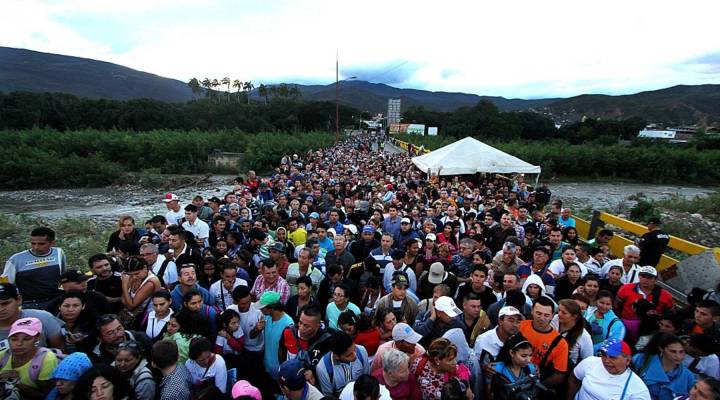
In Venezuela, desperate conditions turn worse
In Venezuela, desperate conditions turn worse

There is more desperation in what’s widely considered the most miserable economy in the world: Venezuela. Food is so scarce that this past weekend, more than 100,000 people surged across a newly opened border to buy rice, flour and milk in Colombia.
Other Venezuelans hunt for food in the black market, paying 20 to 100 times state-controlled prices – that is, if basic staples are available. Still others have been seen sweeping up grain spilled on roads to eat that.
In the western city of Maracaibo, desperate people now crowd at supermarket dumpsters.
“And they take whatever they can, like bones or spoiled vegetables,” said Venezuelan journalist and translator Yesman Utrera, now reporting in Maracaibo. “And they just clean it up and take it home so they can eat something.”
Utrera said he himself has gone without sugar for four months.
This is a humanitarian crisis that many saw coming. Venezuela’s socialist government adopted policies that made the country wholly dependent on imports. Price controls set prices so low that domestic production evaporated. Importers received subsidized, cheap dollars.
But when oil prices crashed, Venezuela ran out of petro-dollars to purchase imports.
“Pigs have to be slaughtered because there’s not enough food for them,” said longtime Venezuela observer Ricardo Hausmann at the Harvard Kennedy School of Government. “Beer cannot be produced because there’s no barley in the country. Trucks and buses have to stop because there are no spare parts in the country.”
By Hausmann’s measure, prices have been rising 24 percent every month since January, a rate that comes out to an annual rate of 1,200 percent. The International Monetary Fund estimates this year’s inflation rate at 480 percent, and projects next year’s to be exceed 1,600 percent. Venezuelans lose purchasing power as the effective exchange rate renders the domestic bolivar increasingly worthless in the world market, and the government prints more and more bills.
Still, there’s not enough money to go around – to pay oil industry suppliers, to pay airlines, or to buy food. Yet bond market indicators suggest Venezuela will continue to pay its debt payments to international creditors. In other words, scarce dollars are going to bondholders instead of hungry people in the slums.
Credit is Venezuela’s lifeline.
“Venezuela needs to send big ships across the ocean, ships that are worth over a hundred million dollars, depending on the price of oil,” said Caracas-based David Smilde, professor at Tulane University and senior fellow at the Washington Office on Latin America. “It’s really completely dependent on international credit markets and international commerce. And it just can’t default.”
At the same time, Smilde said the country also can’t keep going on the way it is.
“We have not hit bottom,” he said. “It can get much, much worse. The conditions continue to deteriorate, and we could see real hunger and starvation. But we’re not there yet.”
There’s a lot happening in the world. Through it all, Marketplace is here for you.
You rely on Marketplace to break down the world’s events and tell you how it affects you in a fact-based, approachable way. We rely on your financial support to keep making that possible.
Your donation today powers the independent journalism that you rely on. For just $5/month, you can help sustain Marketplace so we can keep reporting on the things that matter to you.












